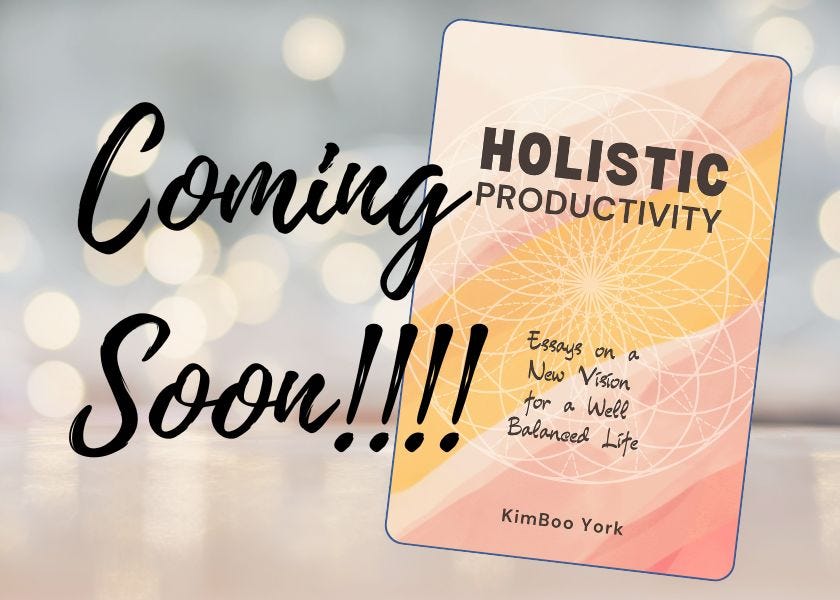Hidden Costs of the "Career Imperative"
Enrich your life, not just your resume
Welcome to All the Tasks Fit to Print, my newsletter on all issues productivity-related for authors (and other solopreneurs)! Watch for my new book, Holistic Productivity: Essays on a New Vision for a Well Balanced Life!
For many of us, childhood activities like piano or sports weren’t merely fun hobbies; they were viewed by our parents as potential gateways to future careers. They were trajectories for success.
During a conversation with a close friend, we talked about how these early lessons on “everything must have a trajectory!” shaped our ideas of success and productivity. Our mothers, products of their own generations, pushed us towards what they believed would lead to achievement, often sidelining our genuine interests because of societal norms or physical stereotypes. My friend, at just five years old, was steered away from ballet, which she loved, due to not having the “ideal” dancer’s physique. She actually did not want to become a ballerina, she simply loved dancing ballet. She was pushed into gymnastics instead.
By the time I was ten, I was discouraged from performing anything in public (theater, dance, debate) because I was considered “too big” (a.k.a. fat) to be competitive at it. This, despite the fact that Mother had previously encouraged me in theater arts for most of my younger childhood. Once it became clear that I was not going to be the pretty, willowy “leading lady” type of daughter, she decided it wasn’t worth my (or her) time.
Maybe she was right about my chances at leading lady stardom, but I would have loved becoming a character actor! Alas, that was not “upwardly mobile” enough for my mother to even consider.
This early molding of our career paths mirrors today’s relentless productivity hustle: Push forward! Aim higher! Stay busy! Strive and hustle!!!
As a productivity coach to authors and other solopreneurs, I watch too many clients fighting through career paths not driven by passion but seen as logical or safe, the “practical choice” of career. This almost always results in a disconnection from their calling and/or passion, which are often demeaned as hobbies at best and “a waste of time” at worst.
We forget that not every passion needs to be monetized or viewed through the lens of career advancement. It’s about enriching our lives, not merely enhancing our resumes. The fact that many people have monetized their beloved hobbies has done a disservice to hobbies in general, in my opinion. Capitalistic hustle culture demands that we put a dollar amount on everything we do, no matter our impulse for doing it. It is the result is a corrosive equation: hobbies take time, and time is money, and money is more valuable than your happiness. I believe instead that we need to be allowed to enjoy doing something whether or not it is marketable.
Stephen Covey’s classic productivity book First Things First advocates prioritizing roles that truly matter to you, a concept similar to my emphasis on guideposts in my Personal Projects Management method. Whether you call them roles or guideposts, though, they are more than just aspirations. They are beacons that align with our deepest values, irrespective of whether they fit into a traditional career trajectory or not.
Holistic productivity challenges us to rethink our approach to all parts of our lives—family, work, hobbies, education, wellness—to focus on our guideposts. It emphasizes balancing various aspects of life so you integrate personal passions with professional endeavors in a way that promotes overall well-being rather than just financial success or career advancement. It allows us to create a lifestyle where work and personal interests enhance and support each other, rather than existing in separate silos.
Here is my question for you: What trajectories are you pursuing, and do they truly align with what makes you fulfilled?
Maybe what you need are fewer trajectories, and instead focus on your values, hopes, and dreams. Stepping off the conventional path can lead to a more meaningful and enriching life, because holistic productivity isn’t just about achieving more, it’s about understanding which achievements are genuinely worth pursuing.
Embracing this philosophy means looking beyond traditional metrics of success to develop an understanding of what productivity really means, and defining success in your own terms. It not only nurtures creativity and passion but also fosters mental and emotional wellbeing, so that all your pursuits are sustainable over the long term.
The practice of holistic productivity helps us find balance in our varied roles—be they as professionals, parents, artists, or activists—to create a richer, more vibrant life for ourselves and everyone we love.
Read about the five pillars of holistic productivity here!


